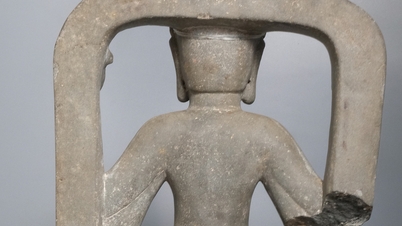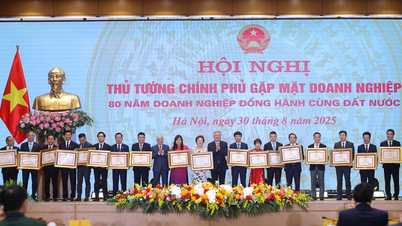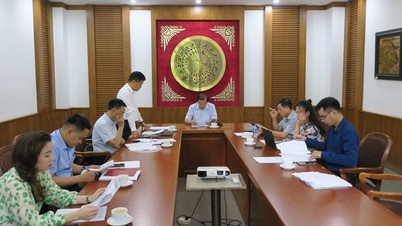In addition to eliminating the monopoly on SJC gold bars, the immediate thing to do is to allow controlled imports and research to establish a legal corridor for gold trading floors.
Remove monopoly and allow gold import
Speaking to Tien Phong reporter , economic expert Ngo Tri Long said that the Vietnamese gold market has been unstable and distorted for many years. As of the end of May, the difference between the domestic SJC gold price and the converted world gold price was up to 15-17 million VND/tael.
The main reason is the administrative management model, import monopoly, lack of connection between the gold bar - jewelry - gold account segments. Speculation, price manipulation and gold smuggling are increasing, reducing market confidence, affecting exchange rates, balance of payments and the safety of the national financial system.
Faced with that situation, on May 28, General Secretary To Lam chaired a meeting with the Central Policy and Strategy Committee, emphasizing the need to comprehensively innovate the thinking of managing the gold market.
This is the right time to change the gold market management policy. Photo: Nhu Y
Following the direction of General Secretary To Lam, the gold market has shifted from the approach of “management by administrative orders” to the model of “creating a controlled market” - that is, respecting the law of supply and demand, having healthy competition but still ensuring the role of the State in controlling systemic risks. This direction not only lays the foundation for considering amending Decree 24/2012 but also suggests strategic reforms.
"The gold market cannot continue to be controlled by rigid administrative tools like in the recent period. The policy of tightening supply, monopolizing the production of gold bars, restricting gold imports... although it has helped stabilize the exchange rate and fight dollarization, is creating serious consequences. Accordingly, the gap between domestic and world gold prices has increased to a record high, distorting the market, increasing speculation and smuggling. People are suffering losses because they cannot access market prices, have to buy "unreasonably expensive" gold, and lose faith in legal wealth accumulation tools," said Mr. Long.
The expert said that the General Secretary emphasized that the State does not replace the market, must establish "fair rules of the game" and implement controlled regulation to develop the gold market healthily - thereby turning gold into a resource, not a policy burden.
According to Mr. Long, in addition to eliminating the monopoly on gold bars, it is necessary to allow controlled gold imports. The State Bank's monopoly on the import of raw gold used to play an important role in stabilizing the macro economy and controlling the market. However, in the current context, this mechanism has revealed many limitations, affecting the healthy development of the gold market.
"Considering policy amendments, allowing gold imports for qualified businesses is necessary to promote competition, stabilize the market and protect consumer rights. We should not allow pure gold imports through bidding, but need to issue controlled quotas, based on actual capacity, business efficiency, compliance with the law and transparent audit results. This approach not only ensures fairness - efficiency - transparency, but also increases healthy competition, limits group monopoly and speculation in the gold market," Mr. Long emphasized.
Set up a gold trading floor
Economist Ngo Tri Long said that while many countries have established national gold exchanges (China, India, Thailand), or encouraged the formation of gold investment funds (gold ETFs), Vietnam still maintains a manual monopoly mechanism.
Singapore established the Singapore Gold Exchange (SGE) in 2014, attracting a large number of foreign investors and improving domestic pricing capabilities. India mobilizes gold from the people through the “Gold Monetization Scheme”, paying interest to depositors in gold and reusing that gold for the jewelry industry. Thailand has more than 200 gold trading enterprises, with prices listed according to world market standards, helping domestic prices stay close to the world.
"It is time for Vietnam to have a market-based, disciplined gold management policy in line with international practices, thereby liberating tens of billions of dollars worth of gold resources that are "lying dead" in the people. Accordingly, a National Gold Exchange should be established that can be integrated into the Ho Chi Minh City International Financial Center, with centralized and transparent transactions, and black market transactions should be limited," said Mr. Long, affirming that the Vietnamese gold market is facing a historic policy turning point. General Secretary To Lam's new thinking is a breakthrough, creating a foundation to transform gold from a passive reserve asset into a resource for economic development.
Sharing the same opinion on establishing a gold exchange, Mr. Pham The Anh - an economic expert at the National Economics University - commented: "Now is the right time to research and build a legal corridor for a gold exchange. A gold exchange will avoid dependence on physical gold. In a way, people will trust that market."
Mr. Pham The Anh added that the task of the State Bank is to amend Decree 24 on gold market management. The recent gold market shows the instability of the macro economy. Domestic gold prices depend on world gold prices but show signs of being more unstable. Accordingly, the monopoly gold brand will be removed to make the gold market freer and more competitive.
"Gold is an asset with intrinsic value, not bought for the prestige of the stamp on the gold," said Mr. Pham The Anh.
According to Ngoc Mai (TPO)
Source: https://baogialai.com.vn/xoa-doc-quyen-vang-mieng-giai-phong-hang-chuc-ty-usd-chet-trong-dan-post326594.html






![[Photo] Politburo works with the Standing Committees of Vinh Long and Thai Nguyen Provincial Party Committees](https://vphoto.vietnam.vn/thumb/1200x675/vietnam/resource/IMAGE/2025/9/8/4f046c454726499e830b662497ea1893)
![[Photo] Politburo works with the Standing Committees of Dong Thap and Quang Tri Provincial Party Committees](https://vphoto.vietnam.vn/thumb/1200x675/vietnam/resource/IMAGE/2025/9/8/3e1c690a190746faa2d4651ac6ddd01a)























![[Photo] Amazing total lunar eclipse in many places around the world](https://vphoto.vietnam.vn/thumb/1200x675/vietnam/resource/IMAGE/2025/9/8/7f695f794f1849639ff82b64909a6e3d)



























































Comment (0)